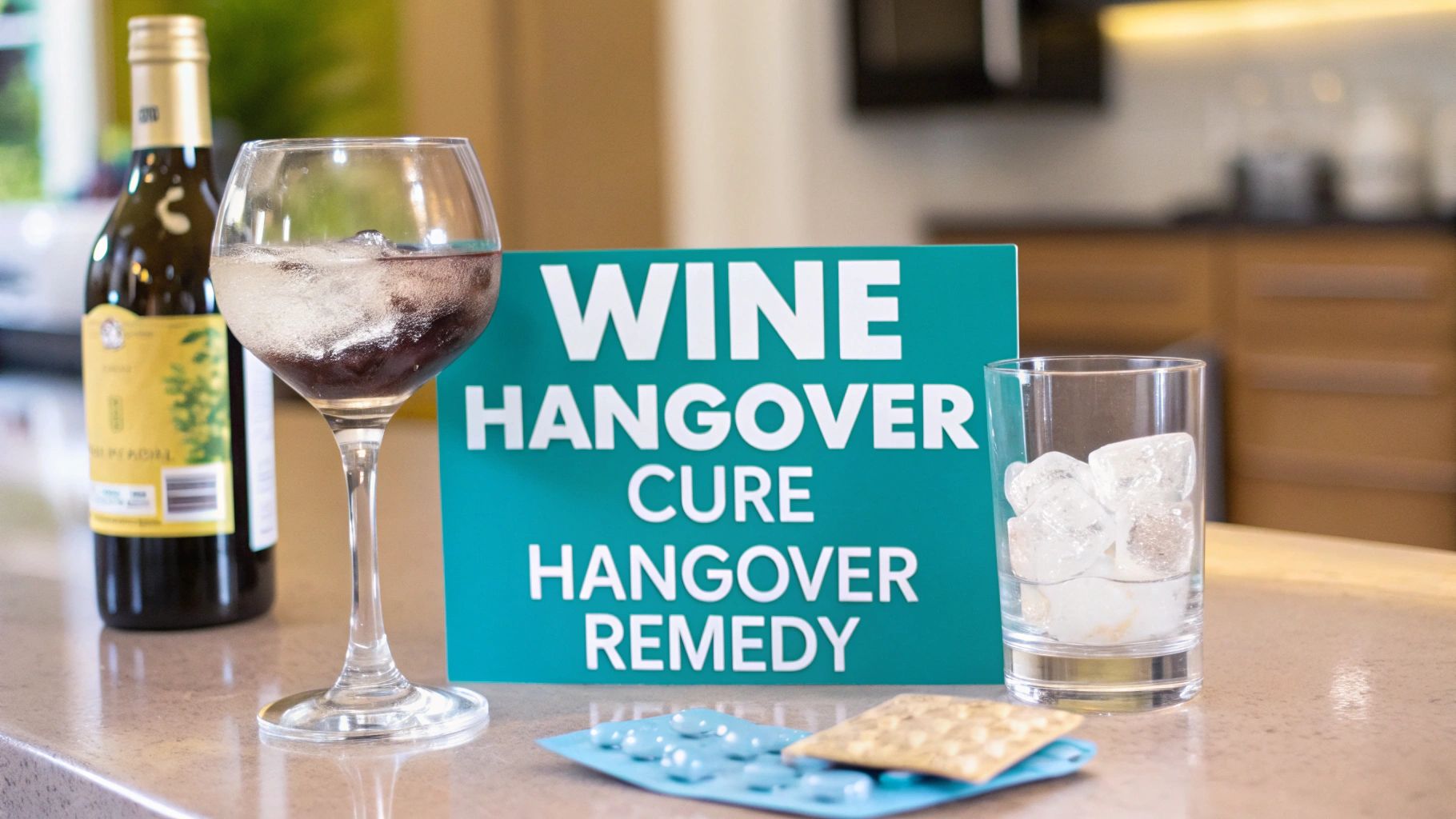

· By Annemarie
How to Cure Wine Hangover: Effective Tips & Remedies
That awful "wine flu" isn't just a figment of your imagination; it's a special kind of misery that goes way beyond just the alcohol content. The real secret to surviving a wine hangover is knowing what you're up against. It's often compounds like congeners, histamines, and tannins that are the true culprits behind that splitting headache and next-day fatigue.
Why That Wine Hangover Feels So Different
Ever woken up after a couple of glasses of Cabernet Sauvignon feeling like you've been hit by a truck, way worse than you would after a few cocktails? You're not making it up.
While all hangovers stem from alcohol's dehydrating one-two punch and the toxic byproduct acetaldehyde, a wine hangover brings a few extra enemies to the fight. The unique makeup of wine, especially red varieties, introduces a whole cocktail of compounds that can supercharge your morning-after misery.
Getting to know these key players is your first step to building a real recovery plan. It’s less about some mythical cure and more about knowing what you’re really fighting.
The Role of Congeners and Histamines
The primary offenders are often congeners, which are natural byproducts from the fermentation and aging process. These are the same substances that give darker liquors and wines their unique flavors and rich colors, but they definitely come with a price.
- Congener Concentration: Darker wines like Merlot, Cabernet Sauvignon, and Malbec are absolutely packed with congeners. On the flip side, lighter options like Sauvignon Blanc and Pinot Grigio have far fewer, making them a much gentler choice if you have plans the next day.
- Histamine Triggers: A lot of red wines are also high in histamines—yep, the same compounds your body releases during an allergic reaction. For anyone who's sensitive, this can trigger instant headaches, flushing, and a stuffy nose, piling on top of the usual hangover symptoms.
The sheer intensity of a wine hangover often boils down to that specific bottle's chemical profile. A high-congener, high-histamine red wine is basically a perfect storm for a headache, inflammation, and just feeling awful.
Sulfites and Tannins Add to the Problem
Beyond congeners, a few other things in your glass contribute to that unique wine ache. Sulfites, which are added as preservatives, can cause reactions in some people, but for most of us, they aren't the main hangover villain.
What's more likely to cause trouble are tannins, the compounds that create that dry, puckering sensation in your mouth. While they give wine its structure and body, they can also trigger the release of serotonin. For people prone to migraines, that can be a direct path to a world of hurt.
If you want to dive deeper into the science, we break it all down in our guide on what causes hangovers.
It’s no surprise that with this growing awareness, the market for recovery aids has exploded. The global hangover cure products market was valued at a whopping USD 2.34 billion in 2023 and is projected to climb to USD 6.18 billion by 2030. This huge jump is all thanks to people like us looking for natural ingredients to help our bodies bounce back. You can discover more insights about this growing market on grandviewresearch.com.
How to Prepare Your Body Before Drinking
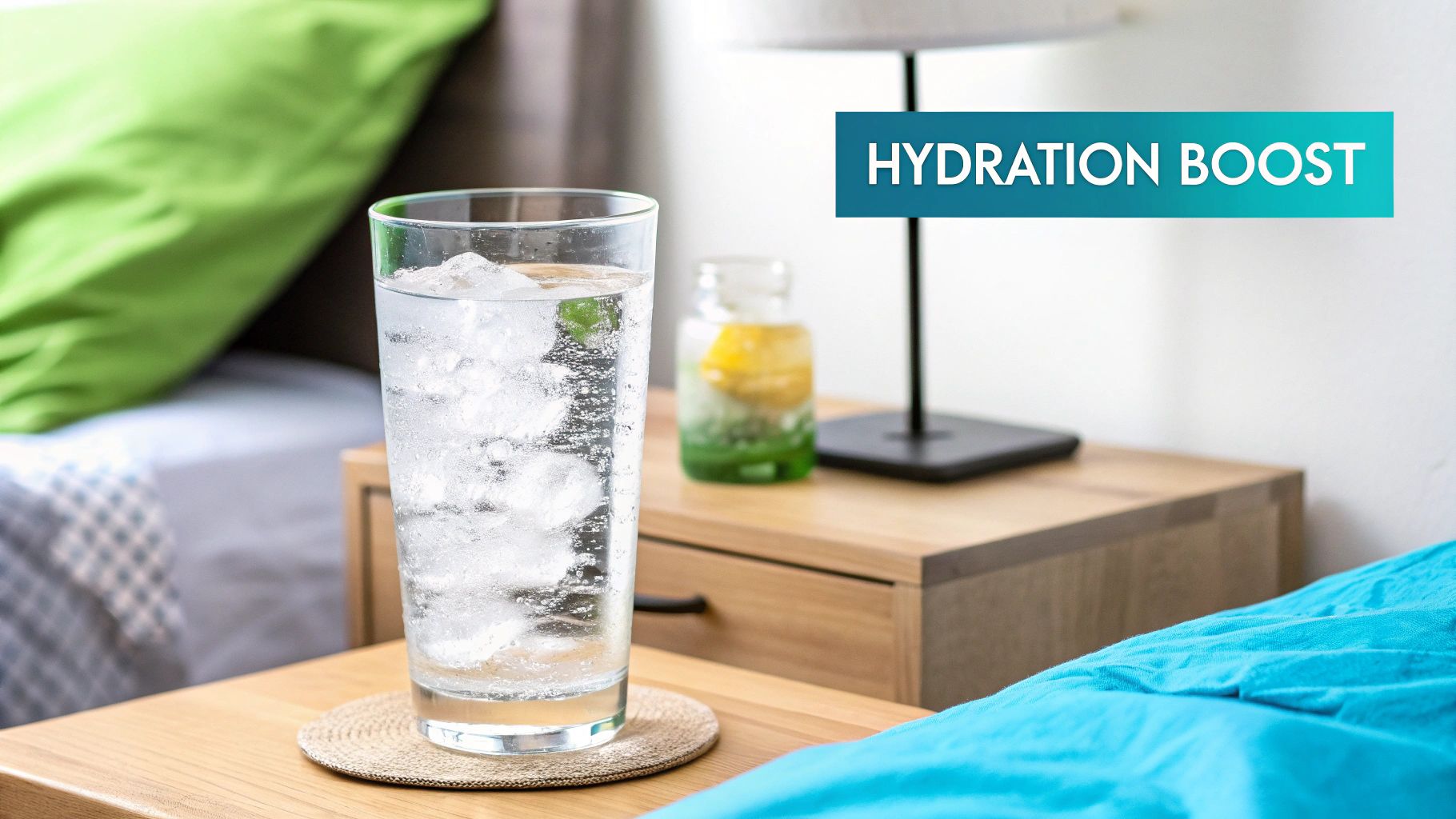
Let’s be honest, the best way to handle a wine hangover is to stop it from ever showing up in the first place. A little prep work before you even pop the cork can completely change your morning-after experience, turning what could be a painful recovery day into just… well, another day. Think of this as your pre-drinking game plan.
And it’s more than just grabbing a quick bite. We’re talking about building a solid foundation of hydration and the right kind of nutrition to help your body process alcohol more efficiently. When your system is properly geared up, it's way better prepared to handle what wine throws at it.
Fuel Your Body Strategically
We’ve all heard it, and it’s true: drinking on an empty stomach is just asking for trouble. Without food in your system to act as a buffer, alcohol hits your bloodstream fast, putting your liver into overdrive. The trick isn't just to eat, but to eat the right stuff.
About an hour before you plan to have a glass, sit down for a balanced meal. You want a good mix of healthy fats, lean proteins, and complex carbs. This trio works together to slow down how quickly your body absorbs the alcohol.
Here are a few ideas to get you started:
- Grilled salmon with quinoa and avocado: You get powerful omega-3s from the fish, protein from the quinoa, and healthy fats from the avocado—a perfect buffer.
- Chicken breast with sweet potatoes: This combo gives you lean protein and slow-digesting carbs for sustained energy and absorption control.
- A hearty lentil soup with whole-grain bread: A fantastic vegetarian option that's loaded with fiber and protein.
A solid meal before drinking isn't just a folk remedy for preventing a headache; you're giving your body the actual tools it needs to manage the effects of alcohol from the get-go.
Supercharge Your Hydration
Showing up to a party already dehydrated is like starting a marathon a mile behind everyone else. Alcohol is a diuretic, which is a fancy way of saying it makes you pee out fluids. If you start out with low water levels, you're on the express train to hangover town.
Start hydrating hours before your first glass of wine. And don't just chug plain water—give it a boost. Tossing an electrolyte powder into your water or sipping on some coconut water gives your body essential minerals like potassium and sodium. Alcohol depletes these quickly, and they're critical for keeping your fluid balance in check.
Give Your System an Edge with Supplementation
Okay, so you've had a good meal and you're hydrated. Want to add one more layer of defense? Smart supplementation can make a real difference.
Your liver works hard to break down alcohol, and that process uses up a ton of vital nutrients. Prepping your body with these nutrients beforehand can give it a serious leg up.
This is exactly what products like Upside Hangover Sticks are for. Taking one before you start drinking loads your system with a blend of vitamins, antioxidants, and DHM (Dihydromyricetin). It's designed to support your liver's natural detox processes, getting it ready to handle alcohol more effectively right from the start.
If you’re serious about building a bulletproof pre-drinking routine, check out our full guide for even more expert tips on how to prevent a hangover before drinking. Combining a solid meal, smart hydration, and targeted support is your best bet against that dreaded wine hangover.
Smart Drinking Habits to Reduce Hangover Risk
What you do while the wine is flowing can seriously make or break your next morning. We’ve all been there—the difference between waking up feeling great and waking up with a pounding headache often comes down to a few simple choices you make with each glass.
Think of it as actively managing your night instead of just hoping for the best. A few smart habits, like how you hydrate and what you choose to sip, give your body the support it needs in real-time. It’s not complicated, I promise.
The Power of Pacing and Hydration
Okay, the single most effective strategy you can use is the classic "one-for-one" rule. It’s simple: for every glass of wine, drink a full glass of water. This isn’t just about staying hydrated; it's about giving your liver a fighting chance by slowing down your alcohol intake.
Your liver can only process about one standard drink per hour, so this deliberate pacing keeps it from getting totally overwhelmed.
This is a great visual of the daily fluid balance your body tries to maintain, and it really shows how easily alcohol can throw things out of whack.
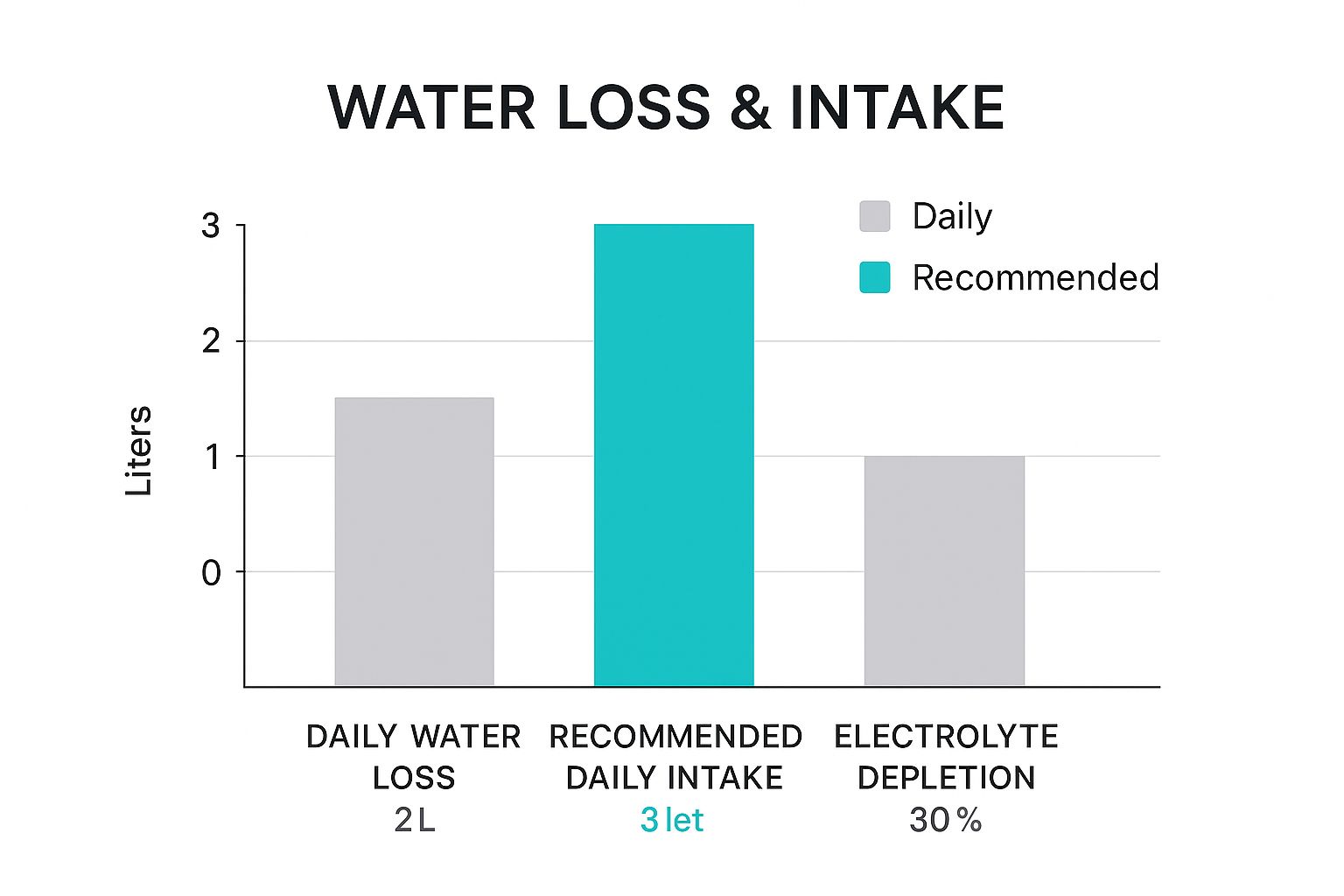
As you can see, we lose a lot of water just through normal daily life. Alcohol just deepens that deficit and drains you of crucial electrolytes at the same time.
Alternating with non-alcoholic drinks helps, too. I’m a big fan of sparkling water with lime. It not only rehydrates but also gives you a glass to hold, so you can sip mindfully instead of constantly reaching for a wine refill.
Key Takeaway: The one-for-one rule is a game-changer. It directly fights dehydration from alcohol's diuretic effect and naturally paces you, preventing that rapid spike in blood alcohol that leads to a monster hangover.
Choosing Your Wine Wisely
Let’s be real, not all wines are created equal when it comes to the morning-after fallout. As we touched on earlier, darker red wines are packed with congeners, those chemical byproducts that are a major hangover culprit. If you know you're sensitive, making a strategic switch can completely change your game plan to cure a wine hangover before it even starts.
If you're not sure which wines are more likely to cause trouble, here's a quick rundown.
Comparing Wines and Their Hangover Potential
This table breaks down common wines by the factors that contribute to how you'll feel the next day.
| Wine Type | Typical Congener Level | Common Notes |
|---|---|---|
| Cabernet Sauvignon | Very High | Dark, full-bodied reds like this are the biggest offenders. |
| Merlot | High | Another popular red with a high congener count. |
| Pinot Noir | Moderate | Lighter-bodied reds tend to be a bit gentler. |
| Rosé | Low | A much safer bet, with far fewer congeners than reds. |
| Sauvignon Blanc | Very Low | Crisp, dry white wines are some of the best choices. |
| Pinot Grigio | Very Low | Generally one of the "cleanest" options available. |
Essentially, the lighter and crisper the wine, the less likely it is to be loaded with hangover-inducing compounds.
Here are a couple more practical tips:
- Go for Lighter Options: Opting for a Pinot Grigio, Sauvignon Blanc, or a crisp Rosé dramatically cuts down your congener intake compared to a glass of Merlot or Cabernet Sauvignon.
- Avoid Sugary Mixers: If you're having a wine spritzer or sangria, watch out for sugary sodas and juices. Sugar can worsen inflammation and lead to that awful energy crash the next day, making you feel even more run-down.
When you pair these smart sipping strategies with proactive support, like taking an Upside Hangover Stick before you head out, you're setting up a powerful defense. This combo helps your body process alcohol more efficiently while minimizing the dehydrating effects and congener impact, setting you up for a much, much brighter morning.
Your Morning-After Recovery Playbook
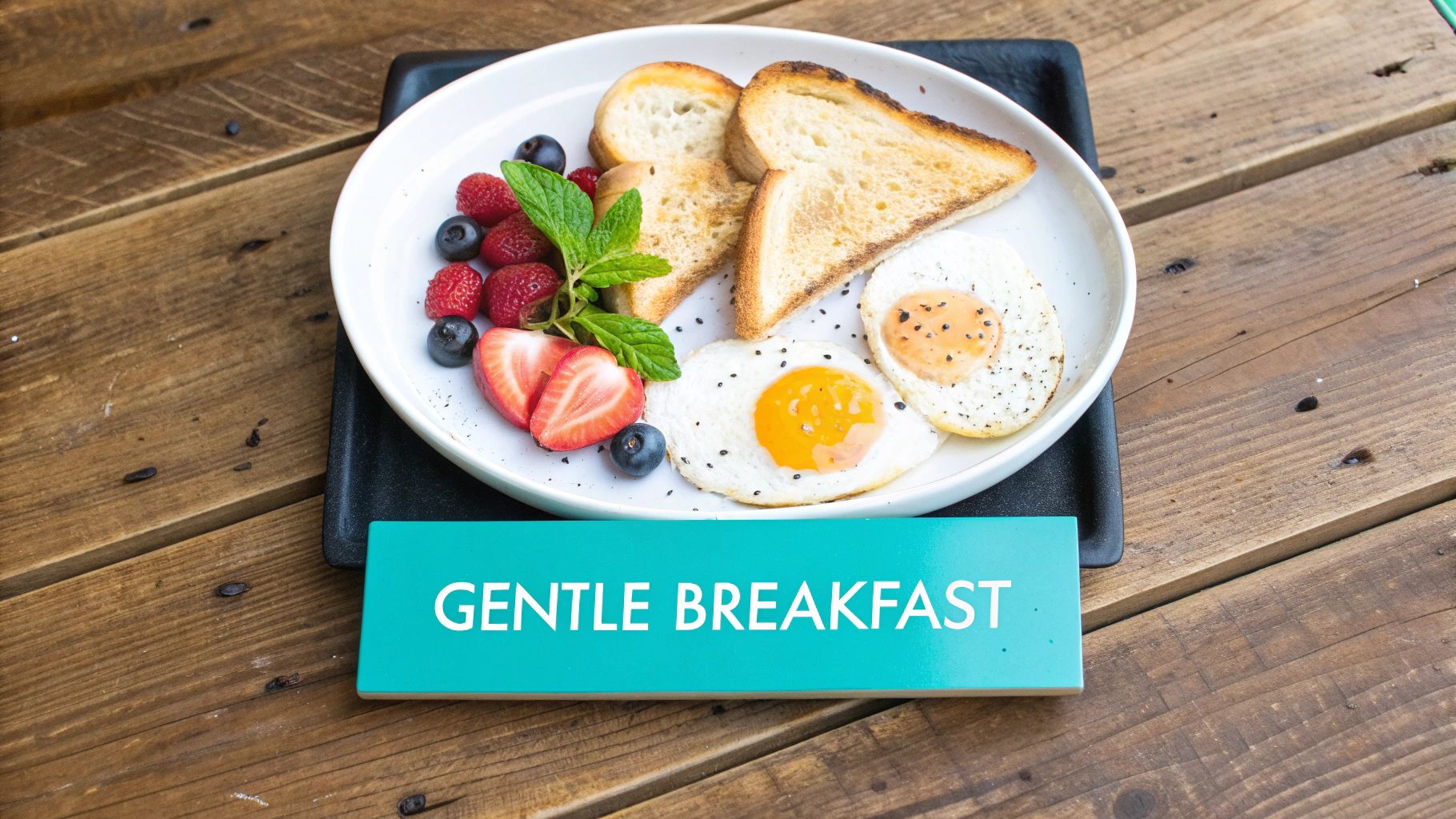
So, you did your best, but the morning still brought that all-too-familiar pounding head and queasy stomach. It happens. The damage is done, but that doesn't mean the day is a total write-off. What you do in the next few hours is what really counts for a faster, smoother recovery.
First things first, forget about those old myths like the "hair of the dog." Adding more alcohol to the mix just delays the inevitable crash. Your body isn't asking for another round; it's desperately trying to rebalance itself. A solid recovery playbook is all about immediate rehydration, getting the right nutrients back in your system, and just being gentle with yourself.
First Priority: Rehydrate and Replenish
Your absolute first move should be to rehydrate, but just chugging plain water isn't going to cut it. A night of drinking strips your body of essential electrolytes like potassium and sodium, which are critical for fluid balance and muscle function. That depletion is a huge reason you've got a killer headache and feel so drained.
To actually get rehydrated, you have to put those minerals back. A glass of water is a good start, but you need to follow it up with something that packs more of a punch.
- Electrolyte Drinks: Think sports drinks, coconut water, or even just a simple electrolyte powder mixed into water. These help your body absorb and hold onto fluids way more efficiently than water alone.
- Nutrient-Rich Fluids: A fruit smoothie can be a game-changer. Bananas are loaded with potassium, berries bring the antioxidants, and a scoop of protein powder can help get your blood sugar back on track.
This is also the perfect time to bring in some targeted support. A morning-after Upside Hangover Stick was literally made for this moment. It delivers a potent blend of electrolytes and vitamins to directly counteract what the alcohol took out, getting you back to feeling human a lot faster.
Rehydration is the cornerstone of any effort to cure a wine hangover. Focusing on electrolyte-rich fluids addresses the root cause of many symptoms, helping you bounce back faster than you would with just plain water.
What to Eat and What to Avoid
We’ve all heard it: just grab a big, greasy breakfast. But honestly, that can often make things worse. Heavy, fatty foods can be a nightmare for an already irritated stomach. The better move is to focus on nutrient-dense foods that are easy to digest and will help stabilize your system.
Your goal is simple: get nutrients back in and level out your blood sugar.
Good Morning-After Food Choices
| Food Group | Examples | Why It Helps |
|---|---|---|
| Complex Carbs | Oatmeal, whole-wheat toast | Provides a steady release of energy to fight that awful fatigue. |
| Lean Protein | Eggs, Greek yogurt | Rich in cysteine, an amino acid that helps break down acetaldehyde. |
| Potassium-Rich | Avocado, banana | Helps replenish electrolytes lost due to alcohol's diuretic effect. |
If the headache is really getting to you, an over-the-counter anti-inflammatory like ibuprofen can help. Just make sure to read the label and stay away from acetaminophen (Tylenol), as it can put extra stress on your liver when alcohol is still in your system.
It's no surprise that the demand for real recovery aids is growing like crazy. The hangover cure market is projected to skyrocket to an estimated USD 8.67 billion by 2033—a massive jump from USD 2.52 billion in 2024. This boom reflects what we all know: people need reliable solutions, from drinks and tonics to handy stick packs, that actually replenish vital nutrients and help the body detox. You can read the full research about these market trends on straitsresearch.com.
Dealing With the Worst of the Worst Hangovers
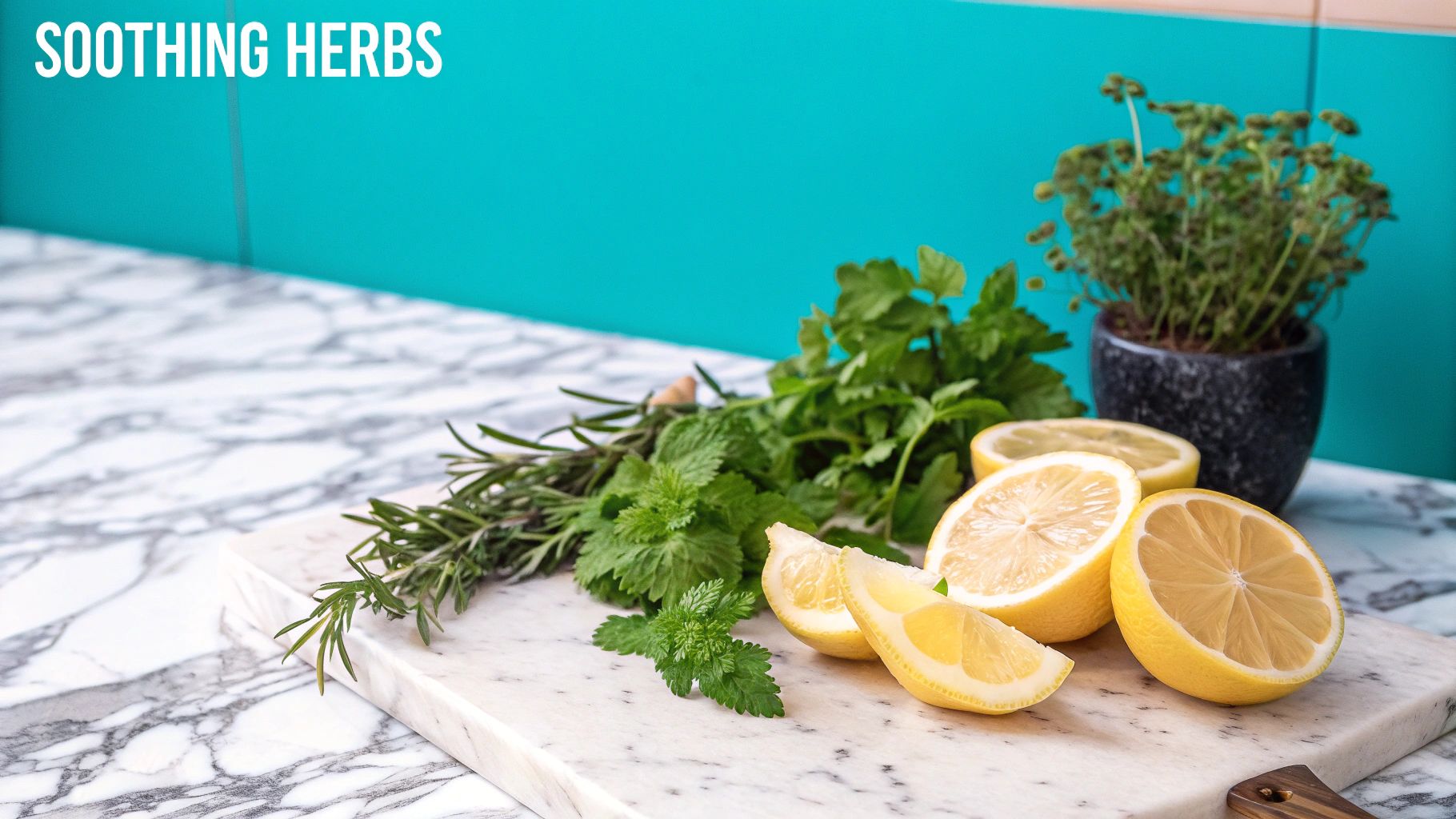
We've all been there. You did everything right—or at least you tried—but you still woke up with a wine hangover that just won't quit. That splitting headache and soul-crushing fatigue are clinging on for dear life, and it’s clear that water and a healthy breakfast aren't going to cut it this time.
When a hangover is that bad, it’s time to call in some specialized reinforcements. This is when you can look at specific supplements that are known to help your body’s natural detoxification and recovery processes. They aren’t magic pills, but they can give your system the targeted boost it desperately needs when it's completely overwhelmed.
Give Your Liver Some Love
Let's be real: your liver takes the biggest hit when you drink. A heavy night puts it under some serious stress. Thankfully, certain natural compounds have a great reputation for supporting liver health and fighting the oxidative stress caused by all those toxic byproducts from alcohol.
- N-acetylcysteine (NAC): This is a powerhouse antioxidant. It helps your body produce more glutathione, which is basically one of your body’s top defense molecules. Drinking alcohol completely drains your glutathione levels, so replenishing it is a big deal.
- Milk Thistle: You’ve probably heard of this one for liver support. It contains a compound called silymarin, which may help shield liver cells from damage.
Think of these supplements as part of a bigger strategy to cure a wine hangover, not as a free pass to overdo it. They work by addressing the damage on a cellular level.
Alcohol completely torpedoes your sleep. It keeps you from getting into the deep, restorative REM and slow-wave stages you need to actually feel rested. That’s why you can sleep for a full eight hours and still wake up feeling like you’ve been hit by a truck—it's just junk sleep.
Gentle Movement and the Power of a Nap
The last thing you probably want to do is move, but a short, gentle walk can actually work wonders. It gets your circulation going, which helps your body flush out any lingering toxins a bit faster. Plus, the endorphin release is a nice little mood and pain lift.
But honestly, the most powerful recovery tool you have is good old-fashioned rest. Alcohol wrecks your sleep quality, and you absolutely have to pay that debt back. If you have the chance, taking a nap is one of the best things you can do. It lets your body finally focus all its energy on healing.
If you want to dig deeper into getting back on your feet, check out our guide on how to cure a hangover fast.
It’s no surprise that the demand for hangover cures is a massive global market. The Asia Pacific region alone makes up about 55% of the global market share in 2024, thanks to a strong social drinking culture. And it's only growing—Australia’s market is predicted to expand at a CAGR of 17% through 2031. You can see more stats on this growing market on persistencemarketresearch.com.
Still Have Questions About Wine Hangovers?
Even with a solid game plan, it's natural to have questions when you're trying to figure out how to feel human again after a few glasses of wine. Let's get into some of the most common ones and give you some straightforward, no-nonsense answers.
Knowing the facts is the first step to building a smarter recovery routine.
Do Red Wines Really Cause Worse Hangovers?
For a lot of people, the answer is a big yes. It really comes down to congeners, which are natural compounds created during the fermentation and aging process. These little guys are notorious for contributing to those classic hangover symptoms like pounding headaches and next-day fatigue.
Think of it like this: darker alcohols, from a bold Cabernet to a smooth bourbon, typically have way more congeners than lighter options like Sauvignon Blanc or vodka. On top of that, many red wines are loaded with tannins and histamines. If you're sensitive, these can trigger inflammation and headaches, creating the perfect storm for a miserable morning.
Can a Product Actually Prevent a Hangover?
Look, no product can give you a 100% guarantee against a hangover, especially if you overdo it. But the right supplements can absolutely take the edge off and dramatically reduce how bad you feel.
That's where something like an Upside Hangover Stick comes in. They're designed to work before the damage is done.
By pre-loading your system with the essential vitamins, electrolytes, and antioxidants that alcohol is known to drain, you’re helping your body process everything more efficiently. You're also fighting off the dehydration and oxidative stress that cause the worst of the symptoms. It’s like giving your body a little armor before heading into battle.
The goal isn't magic; it's smart support. By reinforcing your body's natural defenses, you can seriously lessen the impact of enjoying a few drinks the next day.
Will Splurging on Expensive Wine Prevent a Hangover?
This is one of those myths that just won't go away. Sure, super cheap wines might have extra sugar or weird additives that can make you feel worse, but a high price tag doesn't change the basic science of a hangover.
A fancy, high-end bottle of wine still has alcohol and congeners—the two main culprits. How your body personally handles alcohol and, most importantly, how much you drink are way bigger factors than what the bottle cost. Don't count on an expensive label to be your get-out-of-jail-free card.
What Is the Single Most Effective Hangover Cure?
If you could only do one thing to cure a wine hangover, it should be this: aggressive rehydration with electrolytes. Alcohol is a diuretic, which is just a science-y way of saying it makes you pee a lot. When you do, you lose not just water but also critical minerals like potassium and sodium.
That mineral imbalance is a huge reason you feel dizzy, tired, and have a splitting headache. Plain water is a good start, but a drink or supplement packed with electrolytes is so much better. It helps your body actually absorb and hold onto the fluid, restoring your balance way faster. It’s the absolute foundation of any real recovery plan.
Ready to face your next morning with confidence? Equip yourself with Upside's powerful, science-backed formula and make hangover worries a thing of the past. Try Upside Hangover Sticks today by visiting https://enjoyupside.com.
